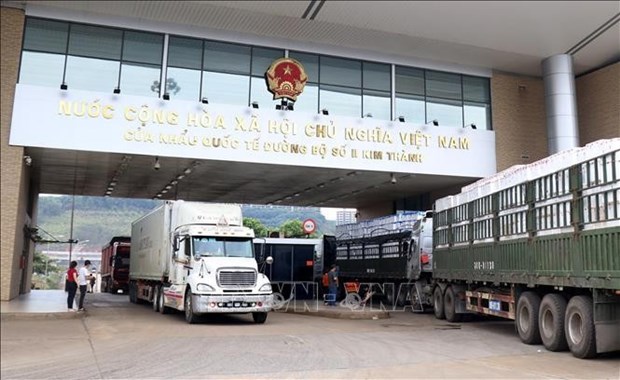PM orders urgent measures to prevent goods congestion at northern border gates
Prime Minister Pham Minh Chinh has signed an official dispatch on the implementation of urgent measures to settle goods congestion and promote the export of farm produce through northern border gates.
 Trucks carrying goods for export to China through Kim Thanh II International Border Gate in Lao Cai province
Trucks carrying goods for export to China through Kim Thanh II International Border Gate in Lao Cai province
The document was issued as there is a surge in number of trucks carrying agricultural products at border gates in the northern province of Lang Son, leading to a high risk of congestion due to long customs clearance procedures and modest clearance capacity.
Meanwhile, many kinds of agricultural products such as durian, jackfruit, litchi and dragon fruits are entering the peak harvesting season.
In the dispatch, the Prime Minister asked leaders of relevant ministries, agencies and localities to roll out a number of urgent measures to minimise congestion at the border gates.
They were asked to promptly review regulations on the import-export of farm produce between Vietnam and China, implement corresponding diplomatic activities, and closely coordinate with Chinese authorities to simplify customs clearance procedures, thus preventing the risk of damage to agricultural products due to the long-lasting procedures and hot weather.
Chairpersons of the People’s Committees of northern border provinces were requested to give evaluation and forecast of the situation, while coordinating with relevant forces to regulate and manage vehicles carrying goods to the border, and assisting them in the customs clearance process. They were ordered to regularly updating localities, agencies and businesses across the country on the circulation and export situation of farm produce so that they can make suitable adjustments.
The Ministers of Industry and Trade, and Agriculture and Rural Development were asked to coordinate with businesses and localities to promote the sale of farm produce in the domestic market.
In the long run, the PM requested relevant ministries and agencies to implement solutions to promote the export of farm produce through official channels and diversify transport methods, while expanding markets and removing barriers in farm produce exports, and speeding up negotiations on farm produce quality and ratio of products subject to inspections for export to the Chinese market.
They were also assigned a number of tasks, focusing on developing production regions meeting regulations on origin and food safety, building standards for agricultural products, and guiding localities in production to meet the market demands, and completing border trade infrastructure to serve agricultural production and exports./.
VNA

